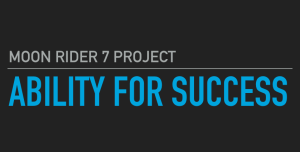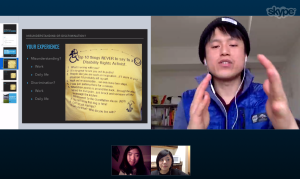この記事は次の言語でも読めます:日本語

We have hosted our first online event “Ability for Success” on 21 Feb in 2016.
What is different in 2016 is that we want to encourage readers of this blog and participant of the event to focus their abilities even when we are talking about disabilities.
Therefore, we changed the name of the event from Big Smile* to Ability For Success.

This time we have a guest, Annie, who is from Taiwan and is pursuing a graduate degree in the U.S.
We shared experience and thoughts on misunderstanding and discrimination of disabilities at work and in daily life
At Work:
Mizuki mentioned that in Japan it is common for the human resource manager to unconsciously or consciously focus on her mobility disability instead of her professional ability when making a human resource decision.
She recalled her past experience.
She had consulted her manager at the time and applied for a sales position within the same company.
Unfortunately, her manager thought becoming a salesperson requires Mizuki to be outside office for long hours and traveling from clients to clients.
the manager thought the sales job may be dangerous to Mizuki so application was declined.
Daily Life:
Annie mentioned her former colleagues in Taiwan were very understanding.
She has not been in any unpleasant misunderstanding scenario.
However, she does experience misunderstanding often in her daily life.
Annie has cerebral palsy and cannot control some movement of her legs as freely as able-bodied people can.
The way she walks is different but when she sits down, no one will notice that she has cerebral palsy.
Annie sometimes takes priority seats in a bus or metro because standing is a tiring task for her legs.
However, because when she sits down her disability becomes invisible she is often asked to yield the priority seats to others who may need those seats.
This misunderstanding sometimes caused inconvenience to Annie.
Another common misunderstanding Annie is experiencing is that Annie’s friends, especially new friends, usually assume Annie requires special care and overcare Annie.
One example Annie gave is that she is able to cross steps that are lower than certain height.
However, a friend of hers thought she could not cross a step even it is a very small and low step.
One day when Annie was walking with the friend and her friend was panic when they saw a small step in the way.
The common misunderstanding Mizuki experienced happens when she takes a train or a bus.
She talked about it here at an old post:
Don’t Push My Wheelchair without Asking Me!
We also talked about the experience of discriminations Mizuki and Annie had.
We will be sharing that as well in our next post.
Thank you very much for reading!
